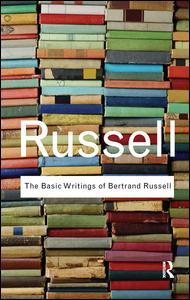Description
The Basic Writings of Bertrand Russell
Routledge Classics Series
Author: Russell Bertrand
Language: English
Keywords
Hold; Follow; principia; Mankind; mathematica; Writings; alfred; Strong; north; Independent; whitehead; Young Men; pure; Incline; mathematics; Cambridge; history; Good Life; western; philosophy; Ill; Principia Mathematica; Confer; Vice Versa; Agnostic; Slightly; Alfred North Whitehead; Lived; Aquinas; Odd; Poor; Standpoint; Nebula; Hydrogen Bomb
Publication date: 06-2017
· 13.8x21.6 cm · Hardback
Approximative price 25.19 €
Subject to availability at the publisher.
Add to cartPublication date: 02-2009
· 13.8x21.6 cm · Paperback
Description
/li>Contents
/li>Readership
/li>Biography
/li>
Preface by Bertrand Russell; Introduction by the Editors; Epigrammatic Insights from the Pen of Russell; Chronological List of Russell’s Principle Works; Chronology of the Life of Bertrand Russell; Acknowledgements; Some Thoughts About Bertrand Russell; PART 1: Autobiographical Asides 1. My Religious Reminiscences 2. My Mental Development 3. Adaptation: An Autobiographical 4. Why I Took to Philosophy PART 2: The Nobel Prize Winning Man of Letters (Essayist and Short Story Writer) 5. How I Write 6. A Free Man's Worship 7. An Outline of Intellectual Rubbish: Hilarious Catalogue of Organized and Individual Stupidity 8. The Metaphysician's Nightmare PART 3: The Philosopher of Language 9. Language 10. Sentences, Syntax, and Parts of Speech 11. The Uses of Language 12. The Cult of 'Common Usage’ PART 4: The Logician and Philosopher of Mathematics 13. Symbolic Logic 14. On Induction 15. Preface to Principia Mathematica 16. Introduction to Principia Mathematica. 17. Summary of Part III, Principia Mathematica 18. Summary of Part IV, Principia Mathematica 19. Summary of Part V, Principia Mathematica 20. Summary of Part VI Principia Mathematica 21. Introduction to the Second Edition, Principia Mathematica 22. Mathematics and Logic 23. The Validity of Inference 24. Dewey’s New Logic 25. John Dewey PART 5: The Epistemologist 26. Knowledge by Acquaintance and Knowledge by Description 27. Theory of Knowledge 28. Epistemological Premisses PART 6: The Metaphysician 29 Materialism, Past and Present 30.Language and Metaphysics 31. The Retreat from Pythagoras PART 7: History of Philosophy 32. Philosophy in the Twentieth Century 33. Aristotle's Logic 34. St Thomas Aquinas 35. Currents of Thought in the Nineteenth Century 36. The Philosophy of Logical Analysis PART 8: The Psychologist 37. Psychological and Physical Causal Laws 38. Truth and Falsehood 39. Knowledge Behaviouristically Considered PART 9: The Moral Philosopher 40. Styles in Ethics 41. The Place of Sex Among Human Values Individual and Social Ethics 42. Individual and Social Ethics 43. 'What I Believe' 44. The Expanding Mental Universe PART 10: The Philosopher of Education 45. Education 46 The Aims of Education 47 Emotion and Discipline 48 The Functions of a Teacher PART 11: The Philosopher of Politics 49 The Reconciliation of Individuality and Citizenship 50 Philosophy and Politics 51 Politically Important Desires 52. Why I am not a Communist PART 12: The Philosopher in the Field of Economics 53. Property 54. Dialectical Materialism 55. The Theory of Surplus Value PART 13: The Philosopher of History 56. On History 57. The Materialistic Theory of History 58 History as an Art PART 14: The Philosopher of Culture: East and West 59. Chinese and Western Civilization Contrasted 60. Eastern and Western Ideals of Happiness PART 15: The Philosopher of Religion 61. The Essence of Religion 62. What is an Agnostic? 63. Why I am not a Christian 64. Religion Cure our Troubles? PART 16: A Philosopher and Expositor of Science 65. Physics and Neutral Monism 66. Science and Education 67. Limitations of Scientific Method 68. The New Physics and Relativity 69. Science and Values 70. Non-Demonstrative Inference PART 17: The Analyst of International Affairs 71. The Taming of Power 72. If We are to Survive this Dark Time- 73. What Would Help Mankind Most? 74. Current Perplexities 75. World Government 76. The Next Half-Century 77. Life Without Fear 78. Science and Human Life 79. Open Letter to Eisenhower and Khrushchev 80. Man’s Peril 81. Methods of Settling Disputes in the Nuclear Age
These books may interest you

Bertrand Russell's Best 123.79 €

Fact and Fiction 166.93 €

Principles of Mathematics 123.79 €

